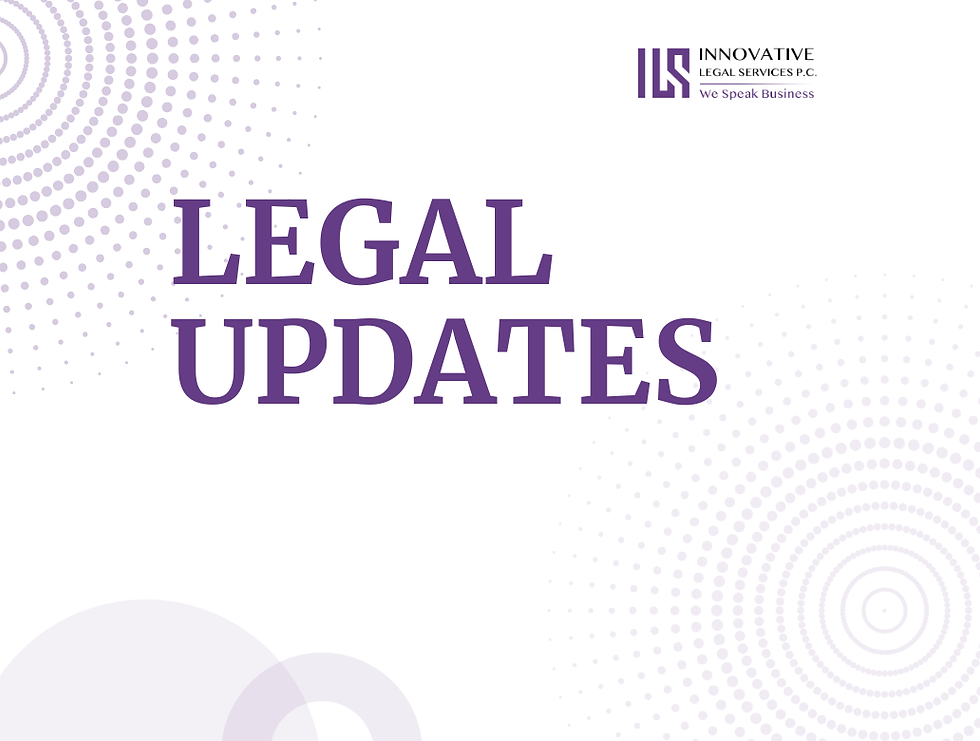DOL Suspends Enforcement of 2024 Independent Contractor Rule
- Richard Liu
- May 23, 2025
- 4 min read
Updated: Oct 22, 2025
On May 1, 2025, the U.S. Department of Labor (DOL) announced that it will no longer apply the 2024 Final Rule when enforcing worker classification under the Fair Labor Standards Act (FLSA). Although the rule remains legally in effect and may still be used in private litigation, DOL investigators have been instructed to stop using it during enforcement. The Department also indicated that it may issue a new rule in the future. This change provides short-term relief for some employers while raising new compliance considerations.
For tailored advice on how these changes may impact your organization, please contact our Managing Partner, Richard Liu, Esq., at contact@consultils.com.

What Was the 2024 Rule?
The 2024 Rule, finalized under the Biden administration, made it more challenging for businesses to classify workers as independent contractors. It introduced a six-factor test, requiring a broad, case-by-case review of whether a worker was “economically dependent” on the employer. All six factors were weighed equally, including:
Opportunity for profit or loss depending on managerial skill
Investments by the worker and the employer
Degree of permanence in the relationship
Nature and degree of control over the work
Whether the work is integral to the employer’s business
Skill and initiative required of the worker
While well-intentioned, many employers found the rule difficult to apply in practice. The lack of a dominant factor often led to inconsistent interpretations and legal uncertainty, particularly for companies in tech, logistics, and other industries relying on flexible workforces.
Why the DOL Suspended Enforcement
After the rule took effect, multiple employer groups filed lawsuits arguing that it imposed significant burdens and deviated from longstanding classification standards. While courts have not blocked the rule, the DOL stated in one appellate case that it was reviewing the rule, and the court stayed proceedings.
In response, the DOL issued Field Assistance Bulletin No. 2025-1, instructing investigators not to use the 2024 Rule in current enforcement actions. The DOL emphasized that this does not repeal or revise the regulation, which remains in effect and may still be applied by courts in litigation. Rather, the enforcement pause allows the Department to reallocate resources and revisit its approach.
What Changed on May 1, 2025
Under the new enforcement guidance, DOL investigators are instructed to apply:
Fact Sheet #13 (July 2008), which reflects earlier interpretations of the economic reality test, and
Opinion Letter FLSA2019-6, which offers guidance on classifying workers in virtual marketplace platforms and gig economy settings.
The economic reality test currently used by the DOL focuses on whether a worker is economically dependent on the employer or is operating their own independent business. Unlike the 2024 Rule, which gave equal weight to six factors, this approach considers the totality of the circumstances, allowing each factor to carry more or less weight depending on the specific facts. This more flexible method gives DOL investigators greater discretion and is generally considered more favorable to employers.
Key factors under this test include:
Whether the work is integral to the employer’s business
The permanence of the relationship
The worker’s investment in equipment or facilities
The degree of control exercised by the employer
The worker’s opportunity for profit or loss
The worker’s use of judgment, initiative, or business skill
The level of independence in business operations
The DOL also clarified that while the 2024 Rule will no longer be applied in enforcement, the Department may still pursue investigations in individual cases—using the pre-2024 economic reality test—if authorized by the Wage and Hour Administrator or their designee.
What Employers Should Do Now
The DOL’s change in enforcement policy does not eliminate the risks associated with misclassification. The 2024 Rule remains enforceable in litigation, and state laws may impose stricter standards. Employers should take the following steps:
Evaluate classifications using both standards: Employers should assess worker classifications under both the 2024 Rule (still in force for litigation) and the older test now used in federal enforcement.
Watch for state-level requirements: States like California, Massachusetts, and New Jersey apply stricter tests—such as the ABC test—that impose different, and often more demanding, criteria for independent contractor status.
Maintain clear records: Employers should document factors that demonstrate contractor independence, such as control over work schedules, use of personal tools, and engagement with multiple clients.
Prepare for further changes: The DOL has not withdrawn the 2024 Rule, but it may propose a replacement. Employers should stay informed and be ready to adjust policies as needed.
For tailored advice on how these changes may impact your organization, please contact our Managing Partner, Richard Liu, Esq., at contact@consultils.com.
Disclaimer: The materials provided on this website are for general informational purposes only and do not, and are not intended to, constitute legal advice. You should not act or refrain from acting based on any information provided here. Please consult with your own legal counsel regarding your specific situation and legal questions.

As Managing Partner at ILS, Richard Liu ranks among the leading U.S. attorneys in corporate, employment, and regulatory law. He is known for crafting legal strategies aligned with clients’ business objectives and advising Fortune 500 companies, startups, and executives on corporate transactions, financing, privacy, and employment matters across the technology, healthcare, and financial sectors.
Before founding ILS, Richard practiced at top defense firms, where he developed a reputation for anticipating risks and designing strategies that balance protection with growth. He has secured favorable outcomes in contract and intellectual property disputes, represented clients in state and federal courts, and is recognized for combining large-firm expertise with boutique-firm agility. Richard is also a frequent speaker at industry and legal conferences.
Email: contact@consultils.com | Phone: 626-344-8949


Comments